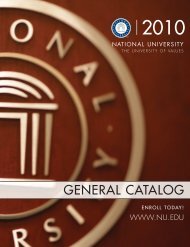Journal of Research in Innovative Teaching - National University
Journal of Research in Innovative Teaching - National University
Journal of Research in Innovative Teaching - National University
Create successful ePaper yourself
Turn your PDF publications into a flip-book with our unique Google optimized e-Paper software.
Experiential Learn<strong>in</strong>g<br />
Global education encourages learn<strong>in</strong>g through personal experiences. It is generally<br />
acknowledged that learn<strong>in</strong>g by do<strong>in</strong>g leads to greater understand<strong>in</strong>g. Therefore, teachers should<br />
not be glued to the traditional methods <strong>of</strong> teach<strong>in</strong>g consist<strong>in</strong>g pr<strong>in</strong>cipally <strong>of</strong> lectures, textbook<br />
read<strong>in</strong>gs, practice exercises, assignments, and tests. Extra effort should be made to use audiovisual<br />
materials and other ICTs, the laboratory, and the library where possible. In addition,<br />
activities should <strong>in</strong>clude excursions, debates, exposés, speeches, and creative writ<strong>in</strong>g. Students<br />
could also be given such assignments as participat<strong>in</strong>g <strong>in</strong> cultural activities, community service,<br />
<strong>in</strong>terviews, school exchanges, sem<strong>in</strong>ars, workshops, conferences, or any other project they can<br />
identify.<br />
Experienc<strong>in</strong>g, even if superficially, what others go through leads to greater empathic<br />
understand<strong>in</strong>g and social responsibility, which accord<strong>in</strong>g to Andrzejewski and Alessio (1999) is<br />
a tenet <strong>of</strong> global citizenship. More and more youths lack the spirit <strong>of</strong> sacrifice and community<br />
service, and this habit ought to be <strong>in</strong>culcated through school activities.<br />
Experiential learn<strong>in</strong>g promotes global citizenship by prepar<strong>in</strong>g students to be responsible<br />
citizens. For Merryfield and Kasai (2004), this is the first goal <strong>of</strong> global education. Schattle<br />
(2008) underl<strong>in</strong>es this po<strong>in</strong>t by stat<strong>in</strong>g that a global citizen ought to be aware <strong>of</strong> oneself and the<br />
world, be responsible to others and the planet ,and participate <strong>in</strong> the affairs <strong>of</strong> the community<br />
whereever he or lives. Citizenship education should therefore provide students withkKnowledge,<br />
skills, and attitudes to act <strong>in</strong> the future to br<strong>in</strong>g democratic change and social justice (Banks,<br />
2004).<br />
Therefore, the global curriculum as summarized above has as its objective to mold global<br />
citizens with shared moral values and a global responsibility to br<strong>in</strong>g global solutions to the<br />
world’s problems. Such a curriculum favors an “<strong>in</strong>clusive global education” characterized by a<br />
curriculum and pedagogic approach that recognizes the diversity <strong>of</strong> all people and strives to<br />
teach peace and social justice (Landorf & Nev<strong>in</strong>, 2007).<br />
Integrat<strong>in</strong>g the Global Curriculum <strong>in</strong> the Language Class<br />
It would appear there is a lot <strong>of</strong> literature on the importance <strong>of</strong> <strong>in</strong>tegrat<strong>in</strong>g global education <strong>in</strong> the<br />
language class, but not enough evidence on how it is actually done by language teachers,<br />
especially at the secondary and high school levels. Tarashava (2005) reports on an <strong>in</strong>novative<br />
course for media students at the New Bulgarian <strong>University</strong>, which focuses on news analysis <strong>of</strong><br />
global issues that are reported <strong>in</strong> the British media. Hillard (2005) also had a special project on<br />
global education for students <strong>in</strong> a language <strong>in</strong>stitute <strong>in</strong> Argent<strong>in</strong>a. In both cases, the beneficiaries<br />
were a select few, which defeats the purpose <strong>of</strong> globaliz<strong>in</strong>g global education. Other studies,<br />
<strong>in</strong>clud<strong>in</strong>g that <strong>of</strong> Mansilla and Gardner (2007), <strong>in</strong>dicate that global education is taught piecemeal<br />
with<strong>in</strong> different subjects the different levels <strong>in</strong> no systematic manner. In Cameroon, there is no<br />
evidence <strong>of</strong> any special projects or attempts to teach global education except as identified <strong>in</strong> the<br />
syllabuses <strong>of</strong> various subjects. I ma<strong>in</strong>ta<strong>in</strong> that English language teachers could be encouraged to<br />
<strong>in</strong>tegrate global issues throughout, s<strong>in</strong>ce it is the only subject that runs through all the levels.<br />
Reasons abound why English language teachers do not <strong>in</strong>tegrate the global curriculum <strong>in</strong><br />
their lessons, some <strong>of</strong> which have been mentioned earlier. For those who f<strong>in</strong>d it difficult to<br />
deviate from the national syllabus, here are some proposals. It should be recalled that the<br />
syllabus and the textbook are separate entities, the latter complement<strong>in</strong>g the former. Teachers<br />
140

















